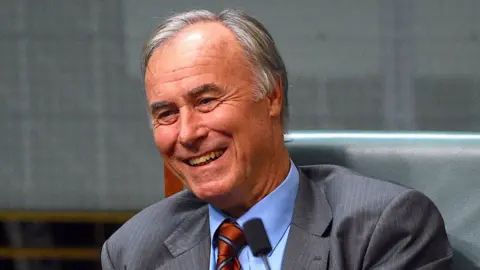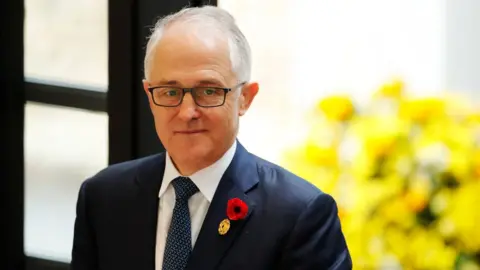Australia citizenship row: Turnbull loses majority as MP resigns
 Reuters
ReutersAustralian Prime Minister Malcolm Turnbull has lost his parliamentary majority after another MP was forced to resign amid a political crisis over dual citizenship.
John Alexander, a former tennis star, said he would step aside as he could "no longer... maintain the belief" he only held Australian citizenship.
Australia's constitution demands politicians are not dual nationals.
The rule has so far unseated the deputy prime minister and five other MPs.
Mr Turnbull has ruled out a general election, insisting he has the support of two independent MPs.
Deputy Prime Minister Barnaby Joyce, whose father was born in New Zealand, and the other politicians were found to have breached election rules on citizenship by Australia's highest court in October.
As a result of the ruling, Liberal Party MP Mr Alexander said he "had to thoroughly examine my situation", leading him to suspect he may have inherited citizenship through a British-born parent.
"It is my obligation that I must resign and that's what I will do," he said.
Malcolm Turnbull's Liberal-led coalition government now has 74 MPs- the same number as the opposition, made up of 69 Labor MPs and five crossbenchers.
 AFP
AFPMr Joyce, leader of Mr Turnbull's coalition partner, the National Party, is running in a by-election to win back his seat. Mr Alexander has indicated he will do the same.
Earlier in the week, Mr Turnbull unveiled plans to make all federal politicians clearly declare their citizenship status to avoid a similar crisis in the future.
Under the new plan, politicians will be obliged to make a formal declaration about their citizenship status, as well as provide details about the time and place of their birth, and the time and place of birth of their parents.
If the politicians had citizenship of another country they will also be required to detail when and how they renounced it.
Current politicians will have 21 days to make the declaration, while future members of parliament will be required to make the declaration when they are elected.
